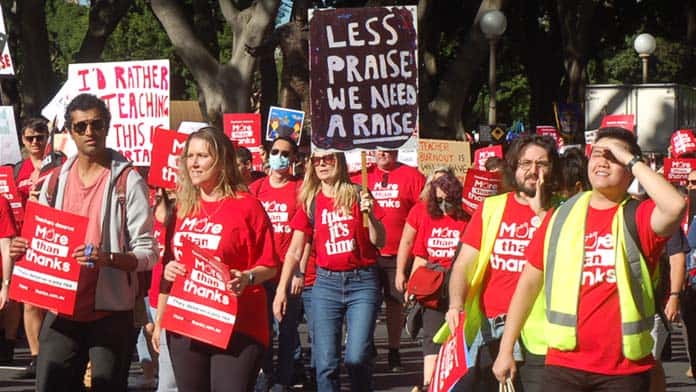Teachers across NSW took strike action today for the second time in five months, with more than 15,000 marching on parliament house.
The crowd was larger than at the previous strike on 7 December last year, following months of teacher shortages that have reached crisis point due to teachers isolating with COVID.
But staff shortages and overwork were already a major problem even before the pandemic.
“The biggest thing at our school is the increase in paperwork—I feel like I have no time left to teach!” a teacher at Endeavour Sports High School told Solidarity.
School principal Melissa Proctor of Greenacre Public School, told the rally that, “Amazing teachers are leaving our profession because they can’t cope with the ever increasing demands of the workload on their own families and their well-being.”
Teachers are working on average 60 hours a week, spending more time on administration and paperwork than actually preparing lessons.
Liberal Premier Dominic Perrottet has offered teachers a paltry 2.04 per cent pay rise per year, when inflation is now over 5 per cent. In light of rising inflation, the teachers’ pay claim of 5-7.5 per cent should be adjusted to at least 7.5 per cent for all teachers.
The NSW government’s pay rise cap for public sector workers is still just 2.5 per cent a year. Perrottet has signalled that he may change this in the state budget in June. But he is not saying by how much.
The government has postponed arbitration of the teachers’ pay and conditions in the Industrial Relations Commission (IRC) until after the budget. But we can’t afford to wait for Perrottet’s vague promises which can’t be relied on. By law, the IRC cannot award a pay increase above the Liberals’ pay cap. Without a 7.5 per cent increase now, teachers are facing a real pay cut.
Opposition leader Chris Minns says he’ll release the ALP’s wages policy closer to the March 2023 state election—that won’t help us win the pay rise we need now.
The government is also refusing our demand for an additional two-hour reduction in face-to-face teaching per week. Winning these hours would give us slightly more breathing space under our unmanageable workloads.
Collective
NSW Teachers Federation President Angelo Gavrielatos told the crowd, “We won’t accept anything less than what we deserve.”
But instead of calling on teachers to come back for further strike action, as at the last strike on 7 December, he simply asked teachers to, “Take the collective energy of today back to your schools, back to your communities” and to “continue campaigning until we win”.
We need to step up our industrial campaign if we want to win. We should be planning for further strike action and joint action with other public sector workers—such as the nurses, transport workers, paramedics, and health professionals—who are also fighting for better pay and conditions.
The IRC, with its rulings against our strikes, its imposition of fines, and threats of fines, has been hampering our organising and campaigning. The first strike in December went ahead in defiance of an IRC order against it.
We need to continue to defy any IRC rulings, and should not be intimidated by the threat of fines. The fines are small and are far outstripped by the numbers of new members joining because of our industrial campaign.
The draconian industrial relations laws in this country contravene workers’ basic right to organise. Rather than keep details of our actions a secret until the last minute, our union should ensure that we are openly campaigning, discussing strategy, and involving the membership in decisions every step of the way, even if it means defying the IRC’s rulings and taking on the anti-strike laws.
We were among frontline workers hailed as heroes only months ago. Now the government claims we are “dud teachers” and not deserving of a pay rise and better conditions. Morrison and Perrottet are on the back foot—let’s step up the fight.
By Solidarity teachers in NSW






